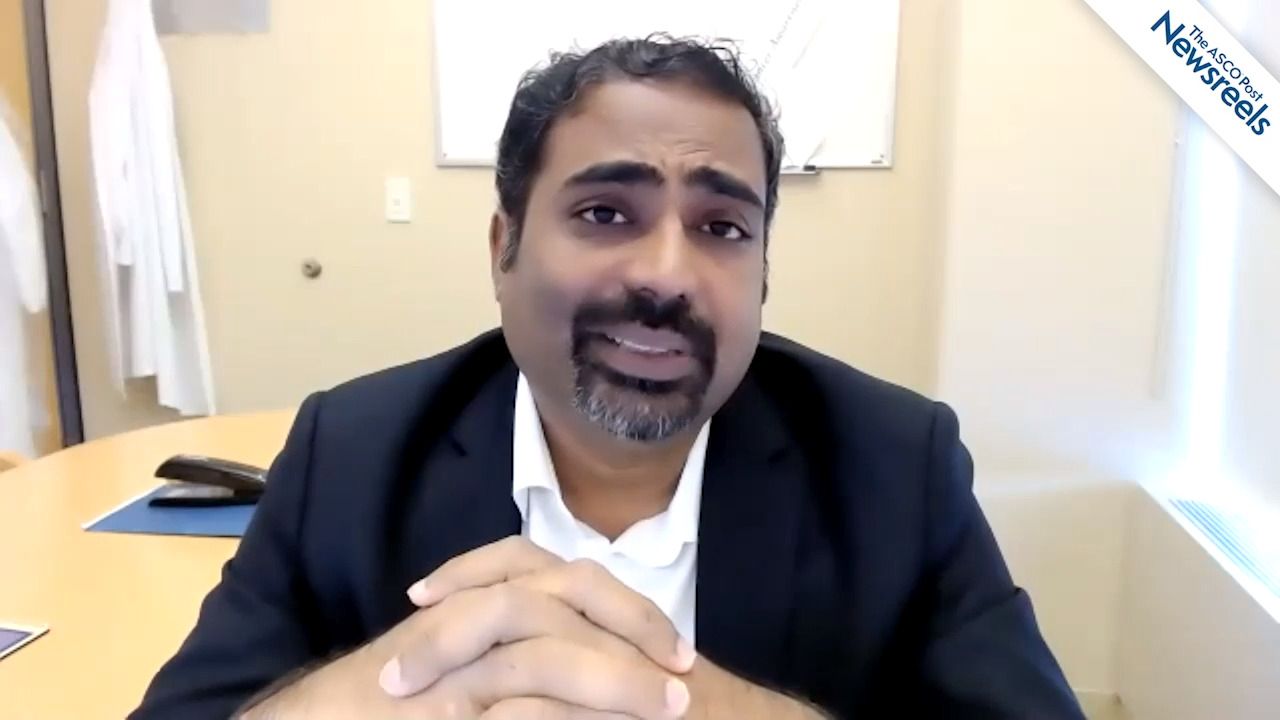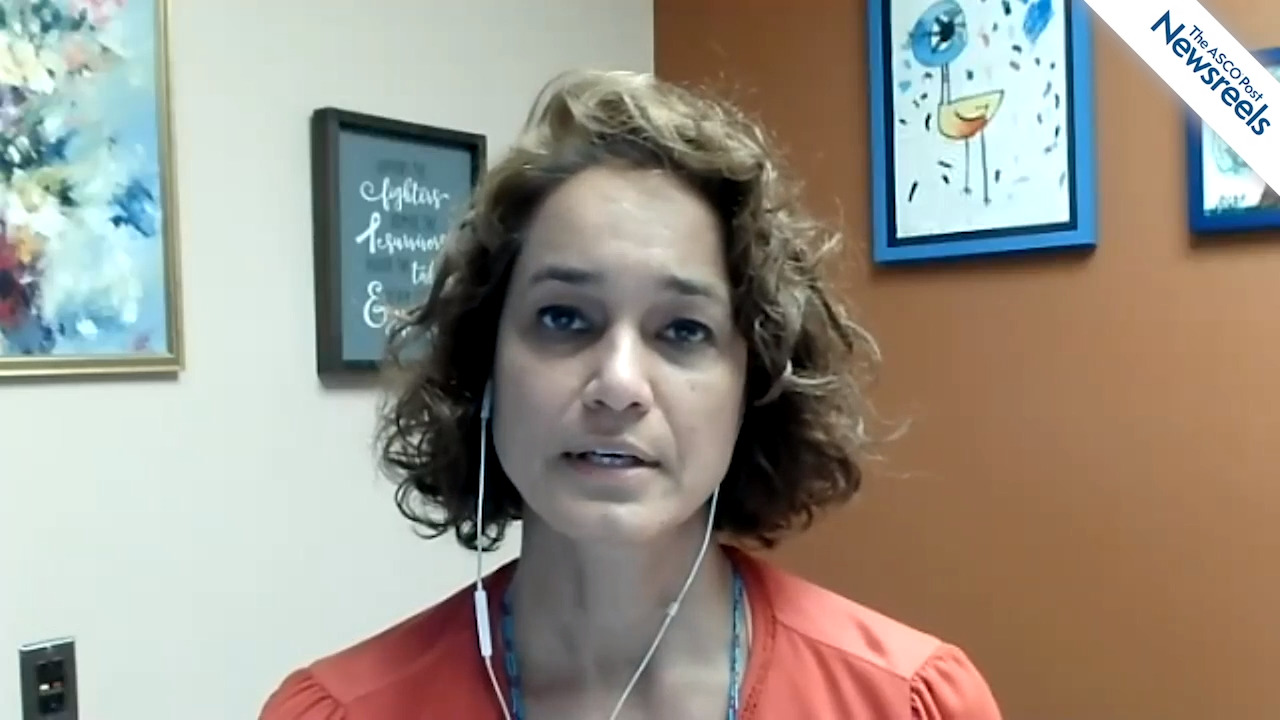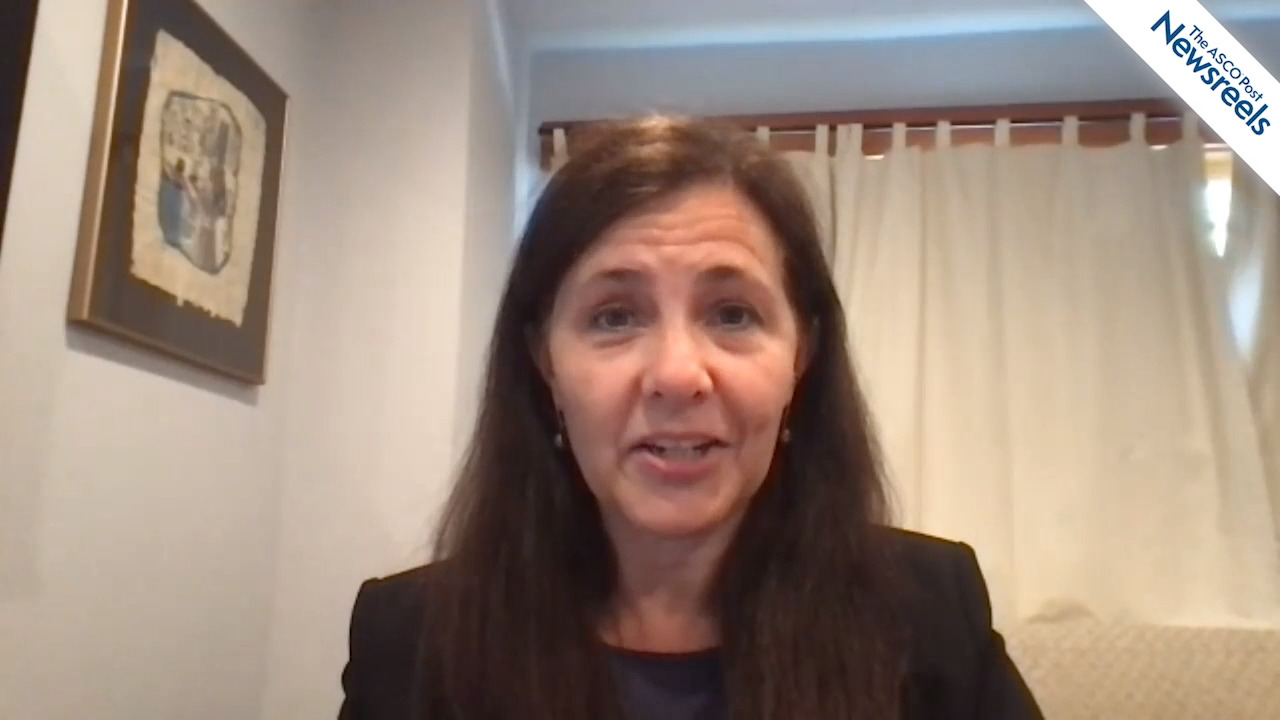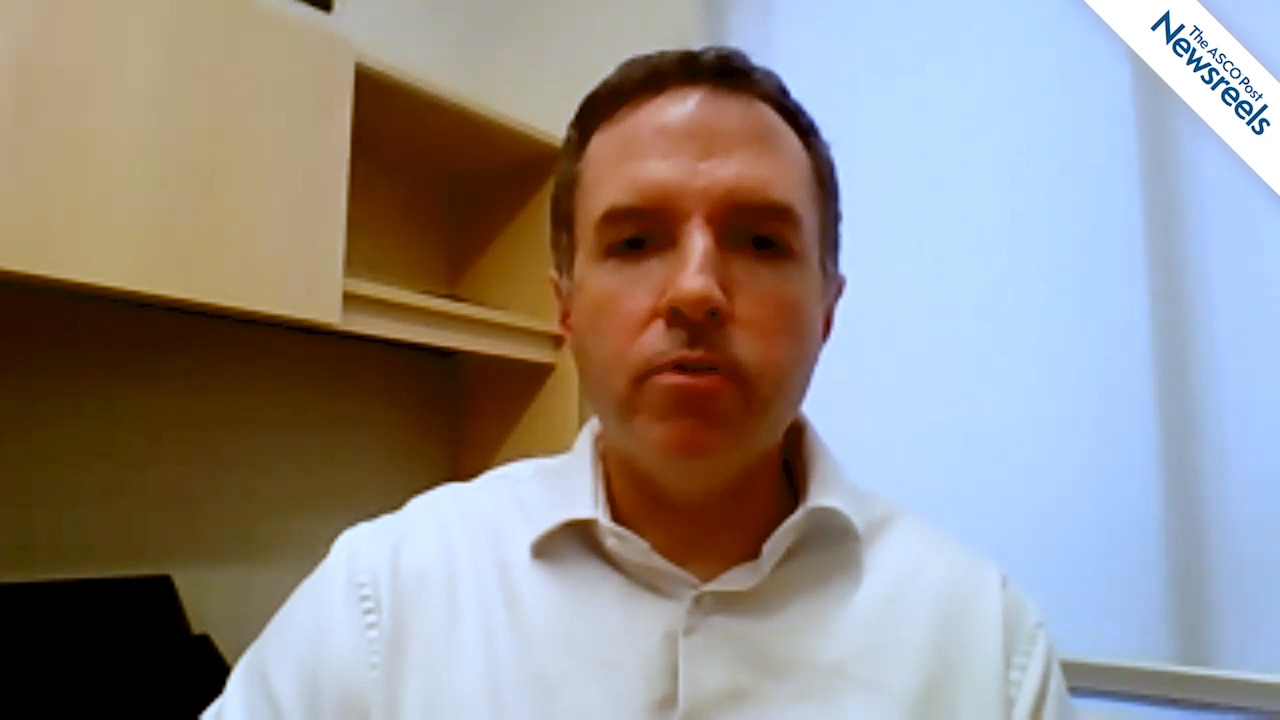Nivolumab/Ipilimumab Improves Overall Survival vs Chemotherapy in First-Line Treatment for Unresectable Malignant Pleural Mesothelioma
As reported in The Lancet by Paul Baas, MD, of The Netherlands Cancer Institute, Amsterdam, and colleagues, a prespecified interim analysis in the phase III CheckMate 743 trial has shown improved overall survival with first-line nivolumab/ipilimumab vs platinum-based chemotherapy in unresectable...
Selected Poster Presentations From the NCCN 2021 Annual Conference
Although once again, the National Comprehensive Cancer Network® (NCCN®) 2021 Annual Conference could not take place on site in Orlando, researchers presented their work virtually in the form of almost 100 posters. The ASCO Post has summarized some that we found particularly interesting. Many...
Atezolizumab Reduces Risk of Disease Progression in Patients With PD-L1–Expressing Early-Stage NSCLC
Atezolizumab given after chemotherapy to patients with resected stage II to IIIA non–small cell lung cancer (NSCLC) significantly improved disease-free survival compared with best supportive care alone in patients whose tumors expressed PD-L1.1 These results of the global phase III IMpower010 trial ...
Inclusion of Patients With Brain Metastases in Phase III Trials in Advanced Breast Cancer, Lung Cancer, and Melanoma
In a study reported in a research letter in JAMA Oncology, Corbett et al found that the majority of phase III trials investigating systemic therapy in patients with advanced lung cancer, breast cancer, and melanoma over the past 20 years have excluded or restricted enrollment of those with brain...
Expert Point of View: Christine Lovly, MD, PhD
Invited discussant Christine Lovly, MD, PhD, Associate Professor of Medicine, Ingram Associate Professor of Cancer Research, Vanderbilt University Ingram Cancer Center, Nashville, discussed progress in targeted therapies for NSCLC. “We have a tremendous amount of knowledge about driver mutations in ...
More Widespread Biomarker Testing for NSCLC in Oncology Practices and More Testing in Black Patients: An Urgent Priority
Even though next-generation sequencing is recommended by the National Comprehensive Cancer Network (NCCN) for biomarker testing for patients with non–small cell lung cancer (NSCLC), the uptake among community oncology practices is suboptimal, and the uptake is even lower among Black patients with...
Effect of Time to Surgery on Recurrence and Survival in Clinical Stage I NSCLC
In a retrospective cohort study reported in JAMA Network Open, Heiden et al found that increased time from preoperative diagnostic computed tomography imaging and surgical treatment was associated with an increased risk of disease recurrence and poorer overall survival in patients with clinical...
Vamsidhar Velcheti, MD, on NSCLC: Sotorasib in KRAS-Mutated Disease
Vamsidhar Velcheti, MD, of New York University, discusses overall survival and exploratory subgroup analyses from the phase II CodeBreaK 100 trial, which evaluated the use of sotorasib in pretreated KRAS G12C–mutant non–small cell lung cancer (Abstract 9003).
Sotorasib for KRAS G12C–Mutated NSCLC: Overall Survival and Exploratory Subgroup Analyses
Results from the phase II cohort of the CodeBreaK 100 study showed that treatment with the KRAS G12C inhibitor sotorasib achieved a 37.1% objective response rate and a median overall survival of 12.5 months in previously treated patients with KRAS G12C–mutated non–small cell lung cancer (NSCLC)....
Byoung Chul Cho, MD, PhD, on NSCLC: Amivantamab Plus Lazertinib for Treatment of Relapsed Disease
Byoung Chul Cho, MD, PhD, of the Yonsei Cancer Center, discusses study results that showed treatment with the EGFR-MET bispecific antibody amivantamab plus the EGFR inhibitor lazertinib yielded responses in 36% of chemotherapy-naive patients with non–small cell lung cancer whose disease progressed on osimertinib. Genetic biomarkers may be able to identify patients most likely to benefit from the combination regimen (Abstract 9006).
Pasi A. Janne, MD, PhD, on NSCLC: Patritumab Deruxtecan to Target HER3
Pasi A. Janne, MD, PhD, of Dana-Farber Cancer Institute, discusses study findings that show patritumab deruxtecan is effective in patients with EGFR-mutated and inhibitor-resistant non–small cell lung cancer. Dr. Janne also explains why targeting HER3, a mutation expressed in most EGFR-altered cancers, is a beneficial treatment approach (Abstract 9007).
Debora S. Bruno, MD, on NSCLC: Racial Disparities in Biomarker Testing and Clinical Trial Enrollment
Debora S. Bruno, MD, of Seidman Cancer Center at Cleveland Medical Center, discusses study findings that show Black patients with advanced or metastatic non–small cell lung cancer tend to be less likely to undergo biomarker testing or to be treated in clinical trials than White patients. Recommended broad-based testing, says Dr. Bruno, may help ensure equal access to quality care and clinical trials (Abstract 9005).
Serendipity Plays a Role in a Journey to a Noted Career in Surgical Oncology
Over the past 2 decades, the oncologic mantra “early detection leads to cure” has taken on special meaning in lung cancer, persistently a leading cause of cancer death in the United States. “Over a 25-year period, we’ve seen a revolution in early detection, understanding of tumor biology, and...
FDA Approves Sotorasib for KRAS G12C–Mutated NSCLC
On May 28, the U.S. Food and Drug Administration (FDA) approved sotorasib (Lumakras) as the first treatment for adult patients with non–small cell lung cancer (NSCLC) whose tumors have a KRAS G12C genetic mutation and who have received at least one prior systemic therapy. This is the first approved ...
Neoadjuvant Durvalumab With vs Without Stereotactic Body Radiotherapy in Early-Stage NSCLC
In a single-center phase II trial reported in The Lancet Oncology, Nasser K. Altorki, MD, and colleagues found that neoadjuvant durvalumab plus stereotactic body radiotherapy (SBRT) resulted in a markedly higher major pathologic response rate vs durvalumab alone in patients with early-stage...
ORIENT-12 Study: Addition of Sintilimab to Gemcitabine/Platinum in Advanced Squamous NSCLC
Adding sintilimab to a regimen of gemcitabine and platinum demonstrated clinical benefit over gemcitabine and platinum alone as first-line therapy in patients with locally advanced or metastatic squamous non–small cell lung cancer (NSCLC). These results from the ORIENT-12 trial were published by...
EMPOWER-Lung 1 Trial: New Options, No New Answers
The EMPOWER-Lung 1 trial, recently reported in The Lancet and reviewed in this issue of The ASCO Post, showed an improvement in progression-free and overall survival with cemiplimab-rwlc in patients with advanced non–small cell lung cancer (NSCLC) and high PD-L1 expression (tumor proportion score...
First-Line Cemiplimab-rwlc Improves Outcomes vs Platinum-Doublet Chemotherapy in Advanced NSCLC With PD-L1 Expression ≥ 50%
As reported in The Lancet by Ahmet Sezer, MD, of Başkent University, Adana, Turkey, and colleagues, the phase III EMPOWER-Lung 1 trial has shown improved overall and progression-free survival with cemiplimab-rwlc vs platinum doublet chemotherapy among patients with advanced non–small cell lung...
FDA Grants Accelerated Approval to Amivantamab-vmjw for Metastatic EGFR Exon 20 Insertion–Mutated NSCLC
On May 21, the U.S. Food and Drug Administration (FDA) granted accelerated approval to amivantamab-vmjw (Rybrevant), a bispecific antibody directed against epidermal growth factor and MET receptors, for adult patients with locally advanced or metastatic non–small cell lung cancer (NSCLC) and...
FDA Pipeline: Applications Accepted for Marginal Zone Lymphoma and Lung Cancer
Recently, the U.S. Food and Drug Administration (FDA) granted Priority Review to zanubrutinib in pretreated patients with marginal zone lymphoma, and accepted a biologics license application for sintilimab injection in combination with pemetrexed and platinum chemotherapy for the first-line...
Heather A. Wakelee, MD, on NSCLC: Atezolizumab vs Best Supportive Care After Chemotherapy
Heather A. Wakelee, MD, of Stanford University Medical Center, discusses the primary disease-free survival results of IMpower010, a phase III study that compared adjuvant atezolizumab vs best supportive care after adjuvant chemotherapy in patients with early-stage resected non–small cell lung cancer (Abstract 8500).
Does Adjuvant Atezolizumab Extend Disease-Free Survival in Patients With Resected Early-Stage NSCLC?
Patients with resected early-stage non–small cell lung cancer (NSCLC) who received the PD-L1 inhibitor atezolizumab following cisplatin-based chemotherapy had a 34% reduction in the risk of disease recurrence compared with best supportive care, according to the results from the phase III IMpower010 ...
Stage IV PD-L1–High Non–Small Cell Lung Cancer: Immunotherapy Alone or With Chemotherapy?
Except in patients with no smoking history, the addition of chemotherapy to immunotherapy does not add benefit as a first-line treatment in patients with stage IV nonsquamous non–small cell lung cancer (NSCLC) and high expression of PD-L1, according to real-world experience. Outcomes from the U.S. ...
Phase II Study of Trilaciclib in Pretreated Patients With Metastatic NSCLC Initiated
PRESERVE 4 (ClinicalTrials.gov identifier: NCT04863248)—a multicenter, randomized, double-blind, placebo-controlled phase II study of trilaciclib administered prior to docetaxel in patients with metastatic non–small cell lung cancer (NSCLC) in the second- and third-line setting who have previously...
ASCO and Ontario Health Publish Joint Update on Guideline for Targeted Therapy in NSCLC With Driver Alterations
ASCO and Ontario Health (Cancer Care Ontario) have jointly published an update1 to the 2017 ASCO guideline2 regarding systemic therapy recommendations for stage IV non–small cell lung cancer (NSCLC) with driver alterations. Guideline Co-Chair Nasser H. Hanna, MD, of the Indiana University Simon...
Cemiplimab-rwlc for First-Line Treatment of NSCLC With High PD-L1 Expression
On February 22, 2021, cemiplimab-rwlc was approved for first-line treatment of patients with advanced non–small cell lung cancer (NSCLC; locally advanced who are not candidates for surgical resection or definitive chemoradiation therapy or metastatic) whose tumors have high PD-L1 expression (tumor...
Expert Point of View: Jhanelle E. Gray, MD
Formal discussant of the CheckMate 816 trial, Jhanelle E. Gray, MD, of Moffitt Cancer Center, Tampa, said that both neoadjuvant and adjuvant therapies have been shown to improve overall survival and relapse-free survival in non–small cell lung cancer (NSCLC). “Overall, neoadjuvant outcomes compare...
CheckMate 816: Neoadjuvant Nivolumab Plus Chemotherapy Boosts Pathologic Complete Response in Resectable NSCLC
Neoadjuvant chemotherapy with nivolumab plus platinum-doublet chemotherapy significantly improved pathologic complete response rates compared with chemotherapy alone in patients with resectable stage IB to IIIA non–small cell lung cancer (NSCLC), according to the results of the CheckMate 816 study...
Accuracy of Lung Cancer Risk Model in Diverse Populations
A commonly used risk prediction model does not accurately identify high-risk Black patients with lung cancer who could gain life-saving benefit from early screening—paving the way for improving screenings and guidelines. These findings were published in a research letter by Shusted et al in JAMA...
FDA Pipeline: Priority Reviews of Treatments for Bladder and Lung Cancers
Recently, the U.S. Food and Drug Administration (FDA) granted Priority Review designation to treatments for surgically resected, high-risk, muscle-invasive urothelial carcinoma and epidermal growth factor receptor exon 20 insertion mutation–positive metastatic non–small cell lung cancer (NSCLC)....
First-Line Immune Checkpoint Inhibitor Monotherapy vs Chemoimmunotherapy in Advanced NSCLC According to KRAS Variant Status
In a study reported in a research letter in JAMA Oncology, Sun et al found that first-line immune checkpoint inhibitor monotherapy was associated with better overall survival among patients with advanced non–small cell lung cancer (NSCLC) with PD-L1 expression ≥ 50% and KRAS variant vs KRAS...
Five-Year Efficacy Outcomes With Pembrolizumab vs Chemotherapy in Metastatic NSCLC With PD-L1 Tumor Proportion Score of at Least 50%
As reported by Martin Reck, MD, PhD, and colleagues in the Journal of Clinical Oncology, the 5-year follow-up of the pivotal phase III KEYNOTE-024 trial shows maintained overall survival benefit in patients treated with pembrolizumab vs chemotherapy—despite substantial crossover to the...
Contralateral Esophagus-Sparing Radiotherapy Technique Reduces Rates of Esophagitis in Patients With Lung Cancer Receiving High-Dose Chemoradiation
In a small, single-institution phase I trial reported in JAMA Oncology, Kamran et al found that the use of a contralateral esophagus-sparing radiotherapy technique in patients receiving high-dose chemoradiation for locally advanced lung cancer was associated with no cases of grade ≥ 3 esophagitis,...
Safety of Stereotactic Body Radiotherapy for Patients With Multiple Metastases
In the phase I NRG-BR001 trial reported in JAMA Oncology, Chmura et al found that stereotactic body radiotherapy (SBRT) could be used safely to treat multiple metastases in patients with breast, lung, and prostate cancers. Study Details The trial was conducted within a consortium of North...
Transmission of Cancer to Infants From Mothers With Cervical Cancer During Vaginal Delivery
In a brief report in The New England Journal of Medicine, Ayumu Arakawa, MD, of the Department of Pediatric Oncology, National Cancer Center Hospital, Tokyo, and colleagues described identification of lung cancer in two boys that likely resulted from transmission of maternal cervical cancer tumor...
Nivolumab/Ipilimumab Plus Two Cycles of Histology-Based Chemotherapy: Another Option in First-Line Metastatic NSCLC
Introduction of immunotherapy has revealed a paradigm shift in the management of patients with metastatic non–small cell lung cancer (NSCLC) that does not harbor a therapeutically targetable driver mutation. Over the past 5 years, several trials have informed treatment decisions, based on disease...
First-Line Nivolumab/Ipilimumab Plus Chemotherapy Improves Overall Survival vs Chemotherapy in Stage IV or Recurrent NSCLC
As reported in The Lancet Oncology by Luis Paz-Ares, MD, of the Universidad Complutense & CiberOnc, Madrid, and colleagues, the phase III CheckMate 9LA trial has shown improved overall survival with first-line nivolumab/ipilimumab plus two cycles of chemotherapy vs four cycles of chemotherapy...
Patient Knowledge and Expectations Regarding Genomic Testing Results
As reported in JCO Oncology Practice by Roth et al, many participants in a biomarker-driven master protocol trial (Lung Cancer Master Protocol [Lung-MAP]; SWOG S1400GEN) did not display correct knowledge or expectations about using the results of genomic testing. Study Details Lung-MAP is a...
First-Line Tislelizumab Plus Chemotherapy vs Chemotherapy Alone in Advanced Squamous NSCLC
In the Chinese phase III RATIONALE 307 trial reported in JAMA Oncology, Wang et al found that tislelizumab plus chemotherapy significantly prolonged progression-free survival vs chemotherapy alone in the first-line treatment of patients with advanced squamous non–small cell lung cancer (NSCLC). As...
Estimated Shifts in Cancer Incidence and Death Over Next 2 Decades
In the next 2 decades, rankings of incidence and death across cancer types in the United States will undergo important changes, according to new research published by Lola Rahib, PhD, and colleagues in JAMA Network Open. The study estimates that pancreatic cancer is on course to become the...
Cancer Aneuploidy May Predict Response to Immunotherapy in Patients With NSCLC
Lower levels of cancer aneuploidy were associated with more favorable outcomes after immune checkpoint inhibition in patients with non–small cell lung cancer (NSCLC), according to data presented by Alessi et al at the virtual American Association for Cancer Research (AACR) Annual Meeting 2021...
Patrick M. Forde, MD, on NSCLC: Nivolumab and Chemotherapy as Neoadjuvant Treatment
Patrick M. Forde, MD, of the Sidney Kimmel Comprehensive Cancer Center at Johns Hopkins University, discusses results from the CheckMate 816 trial, which showed that adding nivolumab to chemotherapy as a neoadjuvant treatment for patients with resectable non–small cell lung cancer improved the pathologic complete response rate to 24%, compared to 2.2% with chemotherapy alone (Abstract CT003).
Neoadjuvant Nivolumab Plus Chemotherapy Boosts Pathologic Complete Response Rate for Patients With Resectable NSCLC
Neoadjuvant nivolumab plus platinum-doublet chemotherapy significantly improved pathologic complete response (pCR) rates compared with chemotherapy alone in patients with resectable stage IB to IIIA non–small cell lung cancer (NSCLC), according to results of the randomized, phase III, open-label...
Expert Point of View: Gillianne G.Y. Lai, MBBS
Gillianne G.Y. Lai, MBBS, of the National Cancer Centre, Singapore, discussed the presentations on novel agents for exon 20 insertion mutations in non–small cell lung cancer (NSCLC), which account for about one-third of tyrosine kinase resistance mutations. Although tyrosine kinase mutations are...
Lung Cancers With Rare EGFR Mutations Being Tackled by Novel Agents
Next-generation inhibitors of epidermal growth factor receptor (EGFR) exon 20 insertion mutations showed promise in patients with advanced non–small cell lung cancer (NSCLC) in early-phase trials presented during the International Association Society for Lung Cancer 2020 World Conference on Lung...
Patients With NSCLC and Driver Mutations May Be More Likely to Present With Brain Metastasis at Diagnosis
The incidence of brain metastasis at diagnosis in patients with non–small cell lung cancer (NSCLC) harboring driver mutations was high, according to findings presented by Rashkit et al at the European Lung Cancer Virtual Congress 2021 (Abstract 38P). However, these patients achieved treatment...
Detection of Emphysema Among Patients With or Without Prior COPD Diagnosis Undergoing Low-Dose CT Screening for Lung Cancer
In a prospective cohort study reported in Clinical Imaging, researchers in the International Early Lung Cancer Action Program (I-ELCAP) identified emphysema in nearly one-quarter of patients undergoing baseline low-dose computed tomography (CT) screening for lung cancer. Three-quarters of those...
Lymph Node Collection Kit May Help Improve Outcomes After Lung Cancer Surgery
A lymph node collection kit may help surgeons attain complete resection and improve long-term survival after curative-intent lung cancer surgery, according to a recent study published by Matthew Smeltzer, PhD, and colleagues in JTO Clinical and Research Reports. Surgical resection is the most...
Analysis Identifies Frequency of PI3K Pathway Alterations in Patients With NSCLC
A retrospective analysis of patients with non–small cell lung cancer (NSCLC) identified potentially targetable alterations in the PI3K pathway that were not mutually exclusive to mutations in other pathways, according to findings presented by Lage et al during the European Lung Cancer Virtual...
Incidence of Brain Metastases in Patients Diagnosed With Stage IV NSCLC During the COVID-19 Pandemic
Computed tomography and/or magnetic resonance imaging demonstrated that 39% of patients diagnosed with stage IV non–small cell lung cancer (NSCLC) presented with de novo brain metastases during the COVID-19 pandemic. This percentage was higher than the historic rate of 25%, and many of these...






